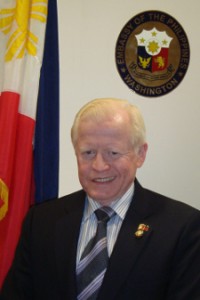San Francisco—If you are eligible for a public benefit, go and get it, use it wisely and promptly. It is not only for your own good, to improve the quality of your life, but it is also good for the county, the state and the federal government. Also, the benefit might be eliminated or reduced, and be taken from you anytime soon.
This is a straightforward message of MC Canlas, an information and assistance specialist of the City funded program Aging and Disability Resource Center of the Episcopal Community Services of San Francisco, whenever he conducts a presentation on the politics and economics of public benefits.
In these tough times when time and again we hear and read in the news about budget mess and deficits, spending cuts of social services, and never-ending debate and negotiations among politicians from the county level to Washington D.C., instead of getting informed, we get more confused and worried. What do we do?
How could the vulnerable sectors of the population – the poor, needy, seniors and persons with disabilities, immigrant families, and the middle class – who are severely impacted ever understand what is happening to their benefits and what may happen to their lives?
Canlas always reminds his audience to always be informed and to voice their concerns to the proper forum. For example, although there are major changes in health care reform bill, particularly about Medicare and Medi-Cal, that beneficiaries are pleased to know, however, these programs are under assault these days. As one report says, “Any politicians eager to find savings by denying poor people access to Medicaid should recognize that they will be harming the health and financial well-being of highly vulnerable Americans. Expanding Medicaid will increase spending in the short run. But the nation will benefit from a healthier, more productive population that, in the long run, may have less need for costly medical services.”
To those who may be eligible for benefits such as Medicare Savings Program, Low-Income Subsidy/Extra Help for Medicare Part D, or Calfresh (formerly food stamp), Home Energy Assistance Program (HEAP), and many more, and now is the time to apply.
For inquiries about benefits for seniors and persons with disabilities, the Aging and Disability Resource Center (ADRC) of Episcopal Community Services of San Francisco is one of the agencies is a good resource.
The ADRC has Information and Assistance specialists who deployed throughout the city to provide seniors and persons with disabilities (ages 18 – 59) with information and referrals on a wide array of services. ADRC staff speaks five major languages (English, Russian, Cantonese, Mandarin, Spanish and Tagalog) and provides assistance on everything from housing information to Medicare low income assistance to Calfresh applications.
ADRC is funded by the San Francisco Department of Aging and Adult Services (DAAS) and works closely with DAAS, Integrated Intake Unit, ILRCSF and many other organizations.
To learn more or for assistance, or would want to hear a presentation on the politics and economics of public benefits for your group, please call the ADRC at 415-487-3370. ADRC main office is located at Canon Kip Senior Center on 705 Natoma Street in San Francisco.


